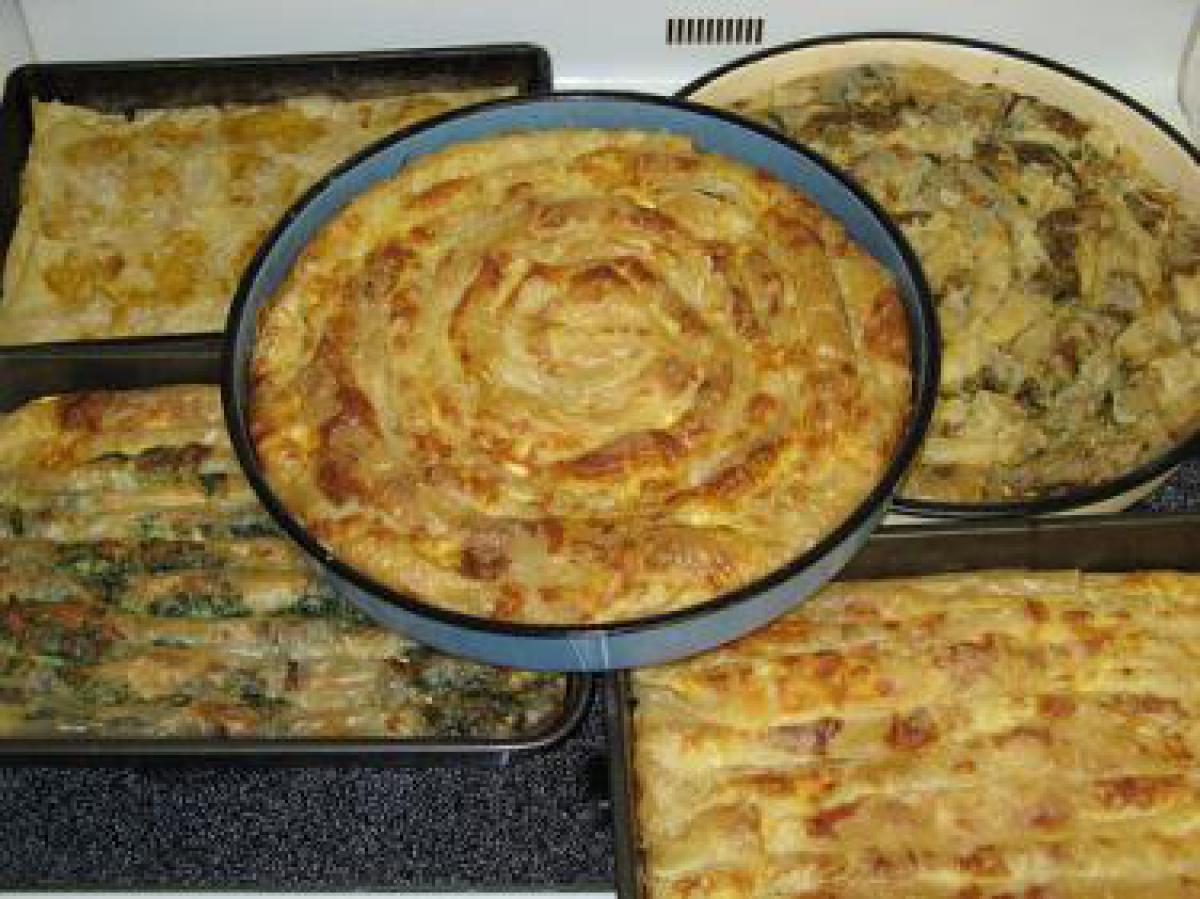What do people eat in Bulgaria?
Diet
Bulgarians usually have breakfast between 8-9 o’clock. A typical breakfast is small and may consist of a pastry and coffee. Lunchtime is at 12 o’clock and may include kebapcheta (grilled minced beef, pork or veal rolled into sausages), kavarma (individual casseroles of pork, veal, onions and mushrooms), or sarmi (vine or cabbage leaves stuffed with rice or meat). These dishes are accompanied by kartofi (potatoes), vegetables, and bread. Dinner is usually between 7 to 8 pm.Meals are usually eaten at home, especially in the evening. Sometimes children have one meal at school and workers at some restaurant nearby. Fish is popular along the Black Sea coast. Fish may be grilled, fried, or prepared in a soup or stew. Tsatsa, a small white fish, is deep-fried in batter and served with fried potatoes. Skumriya na keremidi is mackerel baked in an earthenware container with a rich tomato sauce.
Bulgarians enjoy Turkish and Middle Eastern desserts such as baklava (flaky pastry stuffed with pistachio nuts coated in a sweet syrup) and kadayif (shredded wheat stuffed with nuts in syrup). Bulgarians also enjoy a great variety of torta (cakes) filled with maslena (buttercream), frukti (fruit), or shokoladova (chocolate) as well as sladoled (ice cream). Bulgarians drink their coffee very strong. Herbal teas are also popular. Bulgarians enjoy local wines such as Melnik, a red wine from the southwestern region. Bulgarian spirits include slivova rakiya, which is made from plums, pliska, a type of cognac, and vodka. Bulgarians also make beer: two of the most popular brands are Zagorka and Astika.
Mealtime
In addition to three meals a day, Bulgarians might have a mid-morning snack and afternoon coffee. The continental style of eating is most common. Conversation is expected and everyone waits for all to finish before leaving the table. Napkins are placed on the table, not on the lap. Most Bulgarians eat together during the day when people are at home or at least for dinner during work days.Popular Bulgaria Recipes
- Aubergine Purée (Kyupolu) - Side Dish
- Banitsa (Cheese pastry) - Side Dish
- Banitsa with Spinach - Side Dish
- Cold Yogurt Soup - Side Dish
- Guveche - Main Dish
- Kavarma - Main Dish
- Kebabcheta - Main Dish
- Shopska Salad - Side Dish
- Stuffed Cabbage Leaves - Main Dish
- Stuffed Peppers With Egg and Cheese - Main Dish
- Surmi - Main Dish
- Yoghourt (Yogurt) - Side Dish

World Regions
All Countries
Afghanistan
Akrotiri
Albania
Algeria
American Samoa
Andorra
Angola
Anguilla
Antarctica
Antigua and Barbuda
Argentina
Armenia
Aruba
Australia
Austria
Azerbaijan
Bahamas
Bahrain
Bangladesh
Barbados
Belarus
Belgium
Belize
Benin
Bermuda
Bhutan
Bolivia
Bosnia and Herzegovina
Botswana
Brazil
British Indian Ocean Territory
British Virgin Islands
Brunei
Bulgaria
Burkina Faso
Burma
Burundi
Cabo Verde
Cambodia
Cameroon
Canada
Cayman Islands
Central African Republic
Chad
Chile
China
Christmas Island
Clipperton Island
Cocos (Keeling) Islands
Colombia
Comoros
Congo, Democratic Republic of the
Congo, Republic of the
Cook Islands
Coral Sea Islands
Costa Rica
Cote d’Ivoire
Croatia
Cuba
Curacao
Cyprus
Czech Republic
Denmark
Dhekelia
Djibouti
Dominica
Dominican Republic
Ecuador
Egypt
El Salvador
Equatorial Guinea
Eritrea
Estonia
Eswatini
Ethiopia
Falkland Islands
Faroe Islands
Fiji
Finland
France
French Guiana
French Polynesia
Gabon
Gambia, The
Gaza Strip
Georgia
Germany
Ghana
Gibraltar
Greece
Greenland
Grenada
Guadeloupe
Guam
Guatemala
Guernsey
Guinea
Guinea-Bissau
Guyana
Haiti
Holy See
Honduras
Hong Kong
Hungary
Iceland
India
Indonesia
Iran
Iraq
Ireland
Isle of Man
Israel
Italy
Jamaica
Jan Mayen
Japan
Jersey
Jordan
Kazakhstan
Kenya
Kiribati
Korea, North
Korea, South
Kosovo
Kuwait
Kyrgyzstan
Laos
Latvia
Lebanon
Lesotho
Liberia
Libya
Liechtenstein
Lithuania
Luxembourg
Macau
Madagascar
Malawi
Malaysia
Maldives
Mali
Malta
Marshall Islands
Martinique
Mauritania
Mauritius
Mayotte
Mexico
Micronesia
Moldova
Monaco
Mongolia
Montenegro
Montserrat
Morocco
Mozambique
Namibia
Nauru
Nepal
Netherlands
New Caledonia
New Zealand
Nicaragua
Niger
Nigeria
Niue
Norfolk Island
North Macedonia
Northern Mariana Islands
Norway
Oman
Pakistan
Palau
Panama
Papua New Guinea
Paraguay
Peru
Philippines
Pitcairn Islands
Poland
Portugal
Puerto Rico
Qatar
Reunion
Romania
Russia
Rwanda
Saint Helena, Ascension, and Tristan da Cunha
Saint Kitts and Nevis
Saint Lucia
Saint Pierre and Miquelon
Saint Vincent and the Grenadines
Samoa
San Marino
Sao Tome and Principe
Saudi Arabia
Senegal
Serbia
Seychelles
Sierra Leone
Singapore
Slovakia
Slovenia
Solomon Islands
Somalia
South Africa
Spain
Sri Lanka
Sudan
Sudan, South
Suriname
Svalbard
Sweden
Switzerland
Syria
Taiwan
Tajikistan
Tanzania
Thailand
Timor-Leste
Togo
Tokelau
Tonga
Trinidad and Tobago
Tunisia
Turkey
Turkmenistan
Turks and Caicos Islands
Tuvalu
Uganda
Ukraine
United Arab Emirates
United Kingdom
United States (US)
Uruguay
Uzbekistan
Vanuatu
Venezuela
Vietnam
Virgin Islands
Wake Island
Wallis and Futuna
West Bank
Western Sahara
World
Yemen
Zambia
Zimbabwe
